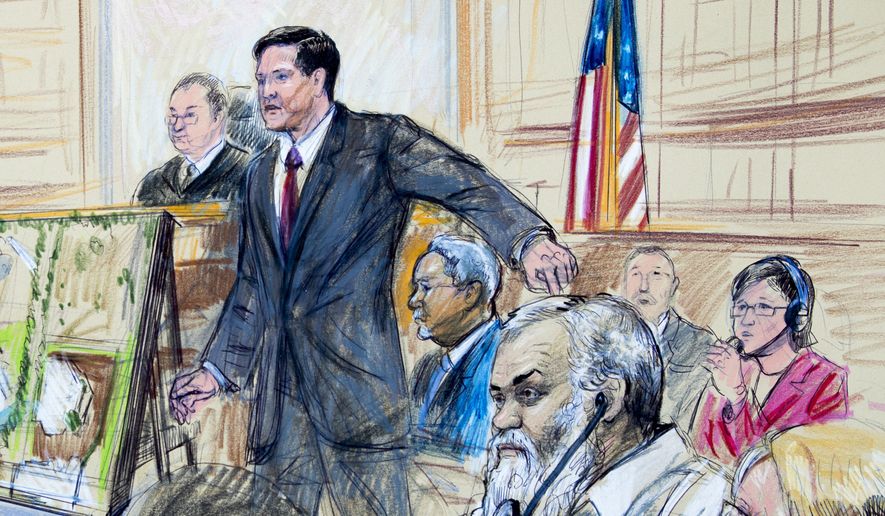The defense team for Ahmed Abu Khattala sought Tuesday to sow doubt that he was the mastermind behind the 2012 Benghazi attack, and suggested the assault that left four Americans dead was an “inside job.”
Federal public defender Michelle Peterson questioned a diplomatic security agent about concerns he had with Libyan guards and pointed to evidence the local militia failed to protect the diplomatic compound properly on the might of Sept. 11, 2012.
In his second day of testimony in the federal trial, State Department Special Agent Scott Wickland said he had concerns about the Libyan guards who comprised the “quick reaction force,” or QRF, employed at the U.S. mission in Benghazi. He said the guards scattered when the compound came under attack.
Two groups of Libyan guards were employed by the Americans at the mission — four armed QRF guards who were members of the local militia, the February 17 Martyrs Brigade, and five unarmed guards from Blue Mountain Libya who primarily served as lookouts and were trained to sound alarms.
Ms. Peterson asked Mr. Wickland, who worked with the guards, whether security incidents that preceded the Sept. 11 attack had given him cause for concern over working with the QRF.
“Yes, I had concerns about that,” Mr. Wickland said.
SEE ALSO: Ahmed Abu Khatallah, Benghazi suspect, ‘hates Americans with a vengeance,’ prosecutors say
Prosecutors objected to some of Ms. Peterson’s cross examination, and U.S. District Judge Christopher Cooper spoke with the attorneys while the jury was out of the courtroom.
“There is going to be evidence that this was an inside job,” Ms. Peterson said during the exchange.
While prosecutors have alleged that Mr. Abu Khattala orchestrated the attack and encouraged others to carry it out because he believed the U.S. was the root of the world’s problems, the defense team said the 46-year-old Libyan mechanic only came to the compound after the security gates were breached because he wanted to see what was going on.
Prosecutors on Monday played a surveillance video that shows Mr. Abu Khattala walking around through the compound with an AK-47 in hand, but neither of the two witnesses who have testified thus far about the attack have described seeing him there.
Ambassador J. Christopher Stevens and State Department information management officer Sean Smith died after the diplomatic compound was set on fire. Security officers Tyrone Woods and Glen Doherty were killed in a separate mortar attack on a nearby CIA-run compound, where the evacuees from the mission took shelter.
Another diplomatic security agent, who was injured in the mortar attack, testified Tuesday that he also had reservations about sharing information with Libyan officials after the assault began.
David Ubben said that after evacuating the mission, he received a phone call from the Libyan foreign minister. While the official made assurances that the government would send police to secure the mission complex, he also inquired about other matters.
“He wanted to know where we evacuated to, and I declined to tell him,” Mr. Ubben said. “I thought it was pertinent not to let anyone know.”
When a member of the QRF team later called him, Mr. Ubben said the man told him the officers had defended the complex.
“He said that they had been doing a lot of fighting, they had killed a number of the attackers and that they had done their best,” Mr. Ubben said. “I didn’t say that much to him. I didn’t believe him, that they had killed that many attackers. I told him to stay safe and to try to get support at the special mission.”
Both Mr. Wickland and Mr. Ubben described encountering the guards just before the American officials evacuated the mission. The guards looked disorganized but they did not show any hostility toward the Americans, Mr. Wickland said. Two of them “had tears in their eyes.”
Mr. Ubben had recovered the body of Smith from inside the burning building, and didn’t want to leave before finding Stevens’ body as well. But he said the February 17 militia members encouraged the Americans to flee, with one particularly frightened man repeatedly telling them they had to go.
When the compound came under fire again, the militia members “just disappeared,” Mr. Wickland said.
Asked whether the Blue Mountain Libya guards, who were also locals, did their job the day of the attack, Mr. Wickland said they did.
In addition to addressing the Libyan guards’ behavior, Mr. Wickland described the terrifying 1-mile drive from the compound to the CIA annex, during which their armored vehicle came under heavy gunfire.
“The glass was all spiderwebs all over the place. You could see bullet impacts all over the entire car, hundreds of rounds,” Mr. Wickland said. “It looked like anybody would be shocked that somebody would survive being in that vehicle.”
He also described the mortar fire that the CIA annex endured, and the injuries Mr. Ubben suffered when the building roof was struck by the rounds.
“The mortar had basically ripped off his leg, he had shrapnel in his face, and it ripped off part of his arm,” Mr. Wickland said of Mr. Ubben. “It’s hard to see your friend like that. I didn’t think Dave was going to live.”
• Andrea Noble can be reached at anoble@washingtontimes.com.




Please read our comment policy before commenting.